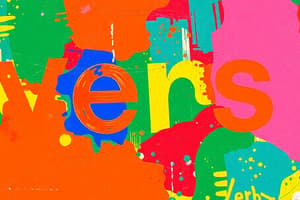Podcast
Questions and Answers
Informelle Bildung beinhaltet nur strukturierte Lernaktivitäten.
Informelle Bildung beinhaltet nur strukturierte Lernaktivitäten.
False (B)
Bildung spielt keine Rolle bei der Aufrechterhaltung gesellschaftlicher Strukturen.
Bildung spielt keine Rolle bei der Aufrechterhaltung gesellschaftlicher Strukturen.
False (B)
Die Bildungssysteme der Gesellschaften müssen sich im Laufe der Zeit nicht an Veränderungen anpassen.
Die Bildungssysteme der Gesellschaften müssen sich im Laufe der Zeit nicht an Veränderungen anpassen.
False (B)
Bildung hat keinen Einfluss auf das wirtschaftliche Wachstum eines Landes.
Bildung hat keinen Einfluss auf das wirtschaftliche Wachstum eines Landes.
Bildung dient ausschließlich dem persönlichen Wachstum und nicht dem gesellschaftlichen Fortschritt.
Bildung dient ausschließlich dem persönlichen Wachstum und nicht dem gesellschaftlichen Fortschritt.
Bildung spielt keine entscheidende Rolle dabei, Individuen mit wesentlichen Werkzeugen für den Erfolg auszustatten.
Bildung spielt keine entscheidende Rolle dabei, Individuen mit wesentlichen Werkzeugen für den Erfolg auszustatten.
Formale Bildung findet ausschließlich in Schulen, Hochschulen und Universitäten statt.
Formale Bildung findet ausschließlich in Schulen, Hochschulen und Universitäten statt.
Die primäre Bildung konzentriert sich auf fortgeschrittene Fächer in spezifischen Bereichen.
Die primäre Bildung konzentriert sich auf fortgeschrittene Fächer in spezifischen Bereichen.
Höhere Bildung umfasst nur Studien auf Hochschulniveau und keine postgradualen Studiengänge.
Höhere Bildung umfasst nur Studien auf Hochschulniveau und keine postgradualen Studiengänge.
Informelle Bildung bezieht sich auf geplante Lernerfahrungen außerhalb des traditionellen Klassenzimmers.
Informelle Bildung bezieht sich auf geplante Lernerfahrungen außerhalb des traditionellen Klassenzimmers.
Nonformale Bildung konzentriert sich auf spezifische Fähigkeiten und Kenntnisse, die für bestimmte Berufe relevant sind.
Nonformale Bildung konzentriert sich auf spezifische Fähigkeiten und Kenntnisse, die für bestimmte Berufe relevant sind.
Bildung umfasst nur den Erwerb von Wissen und Fähigkeiten, nicht jedoch Einstellungen, Werte und Gewohnheiten.
Bildung umfasst nur den Erwerb von Wissen und Fähigkeiten, nicht jedoch Einstellungen, Werte und Gewohnheiten.
Flashcards are hidden until you start studying
Study Notes
Education
Education is a process of learning and acquiring knowledge, skills, attitudes, values, beliefs, and habits needed for personal and social development. It encompasses all kinds of activities that aim to improve the quality of life by providing access to knowledge. There are various forms of education, including formal schooling systems, nonformal education, and informal education.
Formal education typically takes place within institutions such as schools, colleges, and universities, where students follow structured programs of study. This type of education is commonly divided into primary (elementary), secondary, and higher education levels. Primary education focuses on basic literacy, numeracy, and general knowledge, while secondary education builds upon this foundation with specialized subjects. Higher education includes college, university, and postgraduate studies, offering more advanced courses in specific fields.
Nonformal education occurs outside of traditional classroom settings but still involves planned learning experiences. These can include workshops, seminars, distance learning programs, and correspondence courses. Nonformal education often targets specific skills and knowledge relevant to particular occupations or interests.
In contrast, informal education refers to any kind of self-guided learning that happens naturally through everyday experience. Examples of informal education include conversations, reading books or online materials, observing others, and practical experimentation. Informal education is unstructured and often spontaneous, making it flexible and adaptable to individual needs.
The role of education extends beyond simply transmitting information; it also plays a crucial part in maintaining societal structures. As societies change over time, their education systems must evolve too, ensuring they remain responsive to new challenges and opportunities. Additionally, education contributes significantly to economic growth by equipping individuals with the necessary skills for employment and helping countries become competitive in global markets.
In summary, education comes in many forms — from structured classrooms to self-directed exploration — and serves various purposes, ranging from personal growth to societal progress. Its importance cannot be overstated, as it provides individuals with essential tools for success throughout their lives.
Studying That Suits You
Use AI to generate personalized quizzes and flashcards to suit your learning preferences.




